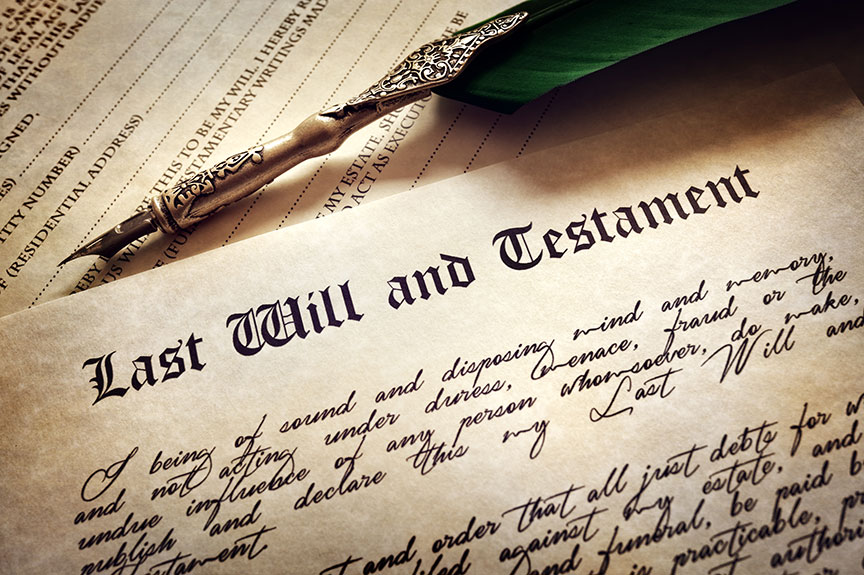
Most people think of August as the time to man the grill or hit the beach. However, August is also “National Make a Will” month. It is a great time to update or do your will.
People sometimes think doing a will is morbid, but it’s actually all about making sure that your assets provide support for the people and causes you love and pass in an efficient way. According to recent polls only 30-40% of Americans have a will. If you don’t have a will, the government has prepared one for you. It’s probably a good idea to do your own.
The Terminology
Sometimes the terminology can be confusing. What’s the difference between a last will and testament versus a living will versus an estate plan vs a trust?
Here is how to distinguish them:
- An estate planis more comprehensive than your will – in fact, both a last will and testament and a living will are usually part of the overall estate plan. First, an estate plan identifies the people you want to benefit from your assets. Second, an estate plan identifies the people you trust to take care of yourself and your assets if you are unable to do so.
- A last will and testament is a legally binding document that distributes your assets and assigns heirs and guardians after your death.
- A living will (aka an advanced directive) is a document that grants trusted advisors to navigate financial and health decisions should you become incapacitated.
- A trust can also be an important part of an estate plan, and is a legal entity you set up to hold, safeguard, distribute and control your assets. A trust can help avoid the probate process and make settling your estate faster and more private.

If You Don’t Have a Will
If you die without a will, the intestacy laws of your state will determine what happens to your property and assets. Typically, your spouse (domestic partner in some states) or children will be the first to inherit your assets; if you are not married and don’t have children, then other relatives may be the recipient of your estate. No relatives? The state usually receives your assets and property in that case. If you are not married, but have a long-term partner, then not having a will that clearly states how you intend your assets to be distributed can mean your final wishes will be ignored. Since intestacy laws usually only recognizes relatives, you will want to clearly state your intentions in a will. The laws of succession vary based on what state you live in, so make sure you check to see what the laws are – or better yet, make sure you have a will.
Creating a Will

If you don’t have a will, now is a great time to create one. There are easy and inexpensive ways you can do it yourself by using online tools. This can work especially well if you don’t have too many complex factors to consider.
You can create a will online and then print your documents and store them in a place where your family members could find them. Be sure to list any important passwords or other information your family should know should something happen to you.
If you have more complex finances, you will likely want to consult an estate attorney to draft your will. Wills can get complicated and you want to ensure your intentions are honored the way you want them to be once you pass.
Here are 6 of the best online will tools of 2021 according to Investopedia.com
Components of a Will
You should compile a complete list of your assets, financial accounts, credit cards, investments and debt that will be easily accessible to the surviving spouse, family member, or trustee. This will make it easier to locate and distribute assets according to your wishes.
Wills can do quite a bit more than just name who gets your money and property. With a will, you can also nominate guardians for your minor children, name caretakers for your pets, leave instructions for digital assets, write your funeral wishes, and more. A will can also save your loved ones time, money, and stress.
Most states require the following for your will to be valid:
- You should be at least 18 years old
- You should be of “sound mind”
- You will need to include what you want done with your assets and property, and if you have minor children, include who will become guardian
- Wills are usually typed or generated by a computer (handwritten wills have different provisions), and should include the statement that this document is your will
- You should appoint an executor who will ensure your estate is distributed correctly according to your will
- You should have at least two witnesses who will see you sign the will, are 18 years or older, are not beneficiaries of your will, and will also sign the will
Updating Your Will
Most people draft their will around a major life event like getting married or having a child – but then they don’t update it as their life progresses.
If you have a will, have you updated it lately and have you done it in a way that will avoid conflict for the rest of the family? Is there a plan to distribute assets in a way that won’t cause more grief after you are gone? You may want to consider the number of beneficiaries you have, or whether there are grandchildren to whom you wish to bequeath your property. Do you have a plan in the event that you and your spouse pass at the same time?
Not having an updated will relevant to your current situation can cause strife within an already grieving family. Double-check your will on a regular basis to make sure it’s written the way you want for your current circumstances.
Summary
Death and dying are never fun subjects, but not having a will can make them even more dismal. Creating a will allows your wishes to be clearly stated. In addition, leaving a gift within your will to SCI Foundation is a simple and powerful way to create a legacy — without costing you anything during your lifetime. Click the link below for more information and for language for you or your attorney to use within your will.
During this National Make a Will Month, use this time to understand the importance of having a will and take the steps to either create or update one. You and your family will be glad you did.
For questions about wills or any other estate or planned giving topics contact Gordon L. Nelson, CPA, CFP® Email: gnelson@scifirstforhunters.org Phone: 435-213-9986
